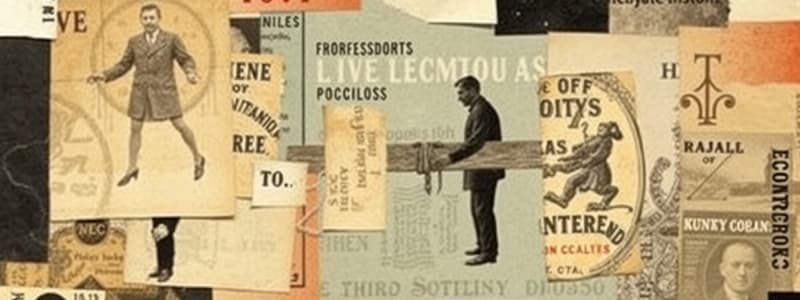Podcast
Questions and Answers
What is money?
What is money?
- A unit of account
- A store of value
- Anything that serves as a medium of exchange
- All of the above (correct)
What does medium of exchange mean?
What does medium of exchange mean?
Anything that is used to determine value during the exchange of goods and services.
What is barter?
What is barter?
The direct exchange of one set of goods or services for another.
Define unit of account.
Define unit of account.
What is a store of value?
What is a store of value?
What does currency refer to?
What does currency refer to?
What is commodity money?
What is commodity money?
Define representative money.
Define representative money.
What is specie?
What is specie?
Define fiat money.
Define fiat money.
What is a bank?
What is a bank?
What is a national bank?
What is a national bank?
What does bank run mean?
What does bank run mean?
What is a greenback?
What is a greenback?
Define gold standard.
Define gold standard.
What is a central bank?
What is a central bank?
What is a member bank?
What is a member bank?
What does foreclosure mean?
What does foreclosure mean?
What is money supply?
What is money supply?
Define liquidity.
Define liquidity.
What is a demand deposit?
What is a demand deposit?
What does money market mutual fund mean?
What does money market mutual fund mean?
Define fractional reserve banking.
Define fractional reserve banking.
What does default mean?
What does default mean?
What is a mortgage?
What is a mortgage?
Define credit card.
Define credit card.
What is interest?
What is interest?
Define principal.
Define principal.
What does debit card mean?
What does debit card mean?
What is a creditor?
What is a creditor?
Flashcards are hidden until you start studying
Study Notes
Money and Its Functions
- Money serves as a medium of exchange, unit of account, and store of value.
- Medium of exchange facilitates value determination during transactions involving goods and services.
- Barter is the direct trade of goods and services without using money.
Functions of Money
- Unit of account allows comparison of values between different goods and services.
- Store of value maintains its worth over time when saved instead of spent.
Types of Money
- Currency consists of coins and paper bills recognized as money.
- Commodity money holds intrinsic value and can be used as money (e.g., gold, silver).
- Representative money derives value from being exchangeable for a commodity of value.
- Specie is a form of money made from precious metals like gold or silver.
- Fiat money has value because a government declares it an acceptable payment method.
Banking Institutions
- Banks are institutions that manage money through receiving, safeguarding, and lending.
- National banks are chartered by the federal government to operate.
- A bank run occurs when many customers attempt to withdraw funds simultaneously, fearing insolvency.
Monetary Systems and Standards
- Greenbacks were paper currency used in the U.S. during the Civil War.
- The gold standard ties paper money's value to a specific amount of gold.
- Central banks lend to other banks during financial distress, acting as a financial safety net.
Banking Operations
- Member banks are part of the Federal Reserve System, which manages U.S. monetary policy.
- Foreclosure refers to the process where property is seized from borrowers failing to repay loans.
Money Supply and Liquidity
- The money supply encompasses all money circulating within the U.S. economy.
- Liquidity indicates how easily an asset can be converted into cash.
Types of Deposits and Funds
- Demand deposits are funds in checking accounts accessible at any time.
- Money market mutual funds pool contributions from individuals to invest in short-term securities.
Banking Practices
- Fractional reserve banking keeps a portion of deposits available while lending out the rest.
- A default occurs when a borrower does not repay a loan.
Loans and Credit
- Mortgages are specialized loans for purchasing real estate.
- Credit cards allow consumers to buy goods/services with a promise to repay later.
- Interest is the cost incurred for borrowing money, while the principal is the initial loan amount.
- Debit cards enable users to withdraw funds directly from their bank accounts.
- Creditors are individuals or entities to whom money is owed.
Studying That Suits You
Use AI to generate personalized quizzes and flashcards to suit your learning preferences.




